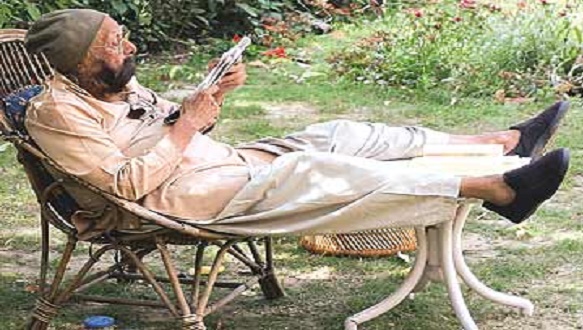
By M GHAZALI KHAN
Much has been written on Khushwant Singh by eminent personalities, writers and activists who knew him personally and had interacted with him. Yet as an Indian Muslim, who enjoyed his writings and jokes I feel there are some aspects of his personality that need to be highlighted and remembered.
I grew up seeing my father, an old Aligarian and a farmer by profession, reading Illustrated Weekly of India very regularly and talking to his friends about Kushwant Singh’s articles and columns.
When I joined AMU in 1974 in PUC the collection of short stories in our English literature course contained “Mark Vishnu” by Khushwant Singh. That was the first time I had ever read anything by the great writer and developed the habit of never missing his “Malice” columns in the Hindustan Times.
I liked his jokes and sarcasm. In the 80s when he was the member of Rajya Sabha the house debated the malice of corruption in the country. Next day in his Malice column Khushwant Singh wrote that seeing politicians speaking against corruption he felt as if whores were sermonising other women on the virtues of chastity.
When it came to writing against sectarianism he did not hesitate in condemning it in the harshest language. During the 1984 anti-Sikh riots when he was forced to flee from his house and take refuge somewhere else he wrote in the Sunday magazine that for the first time he realised how Muslims must have gone through during Moradabad riots.
Although in my student days I used to read his column in the Hindustan Times pretty regularly, I do not remember what he wrote on Moradabad riot. However, Dr Ahmed Cameron a friend and Toronto based scientist recalls how Mr Singh had helped him and his colleagues in organising an exhibition against sectarianism.
“In the wake of Moradabad riots a group of student activists from IIT, Delhi came up with an idea of arranging a poster exhibition against sectarianism and casteism in our society. The famous Hindi poet, Ashok Chakradhar, referred us to Mr Khushwant Singh to obtain some photos of riot hit areas from the library of Hindustan Times then edited by him.
“With no visiting cards with us we scribbled our names on a piece of paper and handed it to his peon to give it to Mr Singh. He immediately called us in his office and inquired about the purpose of our visit. No sooner had we finished our explanation than he called for the librarian of the newspaper and asked him to bring all the photographs of previous riots from his library.
“We selected around 25-30 photos. Mr Singh asked the librarian to print duplicates for us. The librarian expressed some reluctance and inability in printing the photographs or giving us original copies. ‘Librarian Sahib, do you know who they are and from which institution they come from?’ Khushwant Singh asked him rather angrily and continued, ‘They have come to seek our help. They are the students of IIT Delhi, one of the top institutions of our country. They have stood up to send the message of communal harmony after the Moradabad and Belchi riots which have shaken the roots of our nation’s ethos. Let these photos be issued to me and I will sign it’. Librarian was stunned and handed the photos to us. The exhibition was inaugurated by Hon ‘Minister of State for Education, Shiela Kaul, in the RCA of IIT Delhi on Oct 1, 1981 and was covered by all the major newspapers of Delhi.”
On Gujarat riots he wrote, “Gujarat reminded me of the Partition. So many innocents who could not hit back were just killed, butchered, wombs knifed…So many people who nurture hate. You have the Advanis who still have poison inside them; who believe in ‘they need to be taught a lesson.’ And you have the Vajpayees who like to think they are a little more sophisticated than the Narendra Modis and the Togadias. After the demolition of the Babri Masjid — another event that partitioned Indian Hindus and Muslims…”
When writing about women and sex he often became obscene and crossed the lines of decency, although those who knew him personally say that this was his persona and that in his private life he was just the opposite of it. His novel Delhi made Muslims particularly upset. But then in his writings he did not spare anyone.
Despite being threatened by Khalistanis he continued narrating his Sikh jokes in his columns. His depiction of Ranjit Singh in the history of Sikhs is not what you would expect of a faithful Sikh worth his name.
Once he wrote in his column that in his view Sikhism was closer to Islam while KK Birla, the owner of Hindustan Times, thought it was closer to Hinduism and he asked readers to send their opinions. For one or two weeks he published some letters in this regard but stopped it soon as he said many thought that that was not the right time for such a debate. It was in the 80s when Khalistani movement was at its peak.
In bringing facts to light no one could expect clemency from him, not even close friends. He had noticed some contradiction in the professed ideology of his friend and noted progressive Urdu poet Ali Sardar Jafri and his private religious practices. Much to Mr Jafri’s annoyance during a TV interview Khushwant Singh asked him to clarify this contradiction.
He did not hide his good or bad feelings and views about anyone or anything. Although a Sikh once he wrote on the poetic beauty of the Qur’an. Similarly reading his review of Karen Armstrong’s book Muhammad: A Prophet for Our Time one is reminded of another Sikh, the famous Urdu poet Kunwar Mohinder Singh Bedi Sahar’s couplet, ‘Ishq hojai kisi se koi chara to nahiN. Sirf Muslim ka Muhammad pe ijara to nahiN’ (If one falls in love with someone one can’t do anything about it; Muslims alone do not have monopoly upon Muhammad).
On Khushwant Singh’s death, leading Urdu daily Inquilab rightly headed its editorial as, “Ek mohibb-e-Urdu ki maut” (Death of an Urdu lover).
He was very sensitive about correct pronunciation of Urdu words and how the language is spoken. When former Pakistani Army Chief overthrew Nawaz Shareef in 1999, Khushwant Singh wrote that upon learning that Musharraf was born in Delhi he was under the impression that the new Pakistani leader would speak good Urdu. But to his utter disappointment, Khushwant Singh wrote, Musharraf spoke Urdu in Punjabi accent. (Mr Singh had used very harsh language. This particular piece must be available on the net).
Not only did he often quote Urdu verses in his columns, he had translated Allama Iqbal’s famous Shikwa and Jawab-e-Shikwa and Umra-o-Jan Ada, the classic, into English with great elan. Once praising the legendry actor Dilip Kumar he wrote that from his speech and eloquence it appeared as if he had studied in Aligarh Muslim University (AMU).
In the 1980s, Khushwant Singh was also elected as a member of AMU court. I am not sure how many meetings did he attend and how much did he participate in these meetings. Usually he used to pen all of his experiences in his columns but I do not remember having read anything by him about AMU. In the same year AMU Alumni Association (UK) had given me the responsibility of bringing out its annual magazine. I wrote to him requesting him to contribute a small piece in the magazine as a member of AMU Court.
Usually known and busy figures in the Indian sub-continent do not even acknowledge the receipt of such letters let alone giving a decent reply. Although the response was disappointing, I was surprised to receive an aerogram from Singh, in his own handwriting, explaining that he was working on a novel and would not be able to oblige us for until next six months. Strangely even official press release issued by AMU PRO Office does not mention that Singh had been a court member.
He had always been a man of very independent and free thinking. Readers may find following excerpts on his first ever experience in a full time job and as a young Information Officer, at the Indian High Commission in London.
He writes, “Between me and [High Commissioner Krishna] Menon was my ultimate superior, Sudhir Ghosh, the P.R.O, who, unknown to me at the time, was on very bad terms with Menon. Sudhir had worked for a time with Mahatma Gandhi and had been entrusted by the Mahatma to deliver personal messages to Attlee and Cripps…
“It was the autumn of 1947 when Kashmir was overrun by tribesmen coming across Pakistan’s frontiers with Pakistani connivance. The Hindu Maharajah belatedly turned for help to India; Indian troops were rushed to stem the tribal onslaught. The Mahatma made a statement exonerating the Indian Government’s action. This statement repeated by Reuters was given prominence in many English newspapers including The Times. Sudhir, without consulting anyone, sent off a telegram to Bapu…asking him to deny his (Gandhi’s) departure from pacifism. This the Mahatma did. Sudhir sent a letter to The Times quoting the Mahatma’s letter and accusing Reuters of anti-Gandhian bias. Unfortunately, a day earlier I had received the official version of Gandhiji’s speech which I had released to the British Press through the India House news-sheet ‘Indiagram’. The release was worded in exactly the same way as Returers. Christopher Chancellor, then head of Reuters, triumphantly quoted ‘Indiagram’ to refute Sudhir Ghoshe’s allegations. Next morning The Times published Sudhir’s and Chancellor’s letters side by side…
“Ghosh sauntered into the office at 11 a.m. and leisurely began to pursue the daily papers, starting with The Times. He summoned me to his office. ‘Why was this Indiagram sent out without my approval?’ he demanded somewhat haughtily.”
“I could afford to be cheeky, ‘It is always sent out between 4 and 5 p.m. You are seldom in the office at the time. If you like, we will dispatch it a day later. Only, the High Commissioner is anxious that it should get to the papers that very day. Incidentally, he is most anxious to see you at once!’
“…I refused to be snubbed and played the double game as adroitly as I could. ‘I wish you could settle these matters with the High Commissioner, I get one set of orders from him, another from you. And rudeness from both. I will just throw in the sponge.’ I marched triumphantly.
“Menon took it upon himself to suspend Gosh and ordered me to take over till a new P.R.O….
“My own career as Menon’s P.R.O came to a swift and deserved end. He never thought very highly of my ability; he never thought of anyone having any brains except himself.
“…I waited for the opportunity to bring matters to a head. I did not have to wait long…I do not recall the precise details but it had something to do with ‘Miss Singh’ [wife of Military Attaché, a Sikh brigadier] conveying ‘H.E.’s’ instructions to my assistant Jamal Kidwai, destined to be my successor. I pulled her up. She complained to Menon. I was summoned by Menon and asked to apologise to ‘Miss Singh.’ My response surprised Menon. I was rude to both, slapped my resignation on his table and marched out of the office… (My days with Krishna Menon published in Kushwant Singh’s India: A Mirror for its Monsters and Monstrosities, edited by Rahul Singh, IBH Publishing Company, Bombay 1969).
